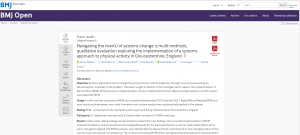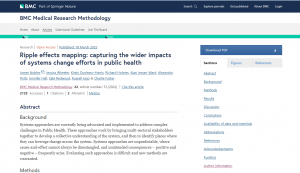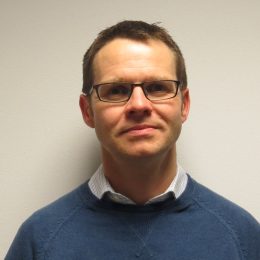Evaluating ‘we can move’: a whole systems approach to addressing low levels of physical activity in Gloucestershire
Lack of physical activity is a major public health issue in many rich countries. In England, one in four women and one in five men do less than 30 minutes of moderate activity a week.
There are many complex reasons for low levels of physical activity across a population, with a recent academic paper identifying 45 factors – from air quality, to cycling infrastructure, to an individuals’ level of disposable income.
In Gloucestershire, one in five adults do less than 30 minutes of physical activity each week. Active Gloucestershire, a charity based in Gloucester, is carrying out a whole systems approach to increase physical activity called we can move. A whole systems approach looks at the complex web of factors that cause a problem, and then aims to identify parts of the system that can be changed.
We can move aims to help people in Gloucestershire become more physically active. To achieve this, they want to make physical activity the norm by targeting the physical environment including transport infrastructure, workplaces, communities and schools. This requires help and support from the County Council, NHS trusts, the voluntary and community sector and citizens themselves.
NIHR ARC West and colleagues from the University of Bristol’s School for Policy Studies were Active Gloucestershire’s evaluation partner for we can move between April 2019 and April 2021.
Project aims
The research team aimed to understand two main questions:
- How is we can move implemented in Gloucestershire and what are the learnings associated with this?
- What changes have occurred in Gloucestershire that could be associated with we can move?
We then wanted to use this information to answer a third research question:
- What are the implications of this learning for we can move in the future?
What we did
The evaluation of a whole systems approach is difficult. To try and comprehensively answer the research questions, we used a range of techniques, including:
- Systems mapping to understand the broad and diverse causes of low physical activity in Gloucestershire
- Interviews with a wide range of people who were involved in, or impacted by, the we can move programme
- Annual surveys of stakeholders who were involved in we can move
- Ripple effects mapping to explore the wider, anticipated and unanticipated, impacts of we can move. This is a method that we have identified and adapted for the specific purpose of better understanding whole systems approaches.
- Audits of the processes followed by Active Gloucestershire staff when implementing we can move
- An analysis of the stakeholder database to determine how many people were involved in we can move and the area of the system that they influence
We then combined the findings from these methods to answer the research questions.
Another important part of this work was that the lead researcher was embedded in Active Gloucestershire. Before the pandemic, this meant that they spent at least one day a week in the Active Gloucestershire offices to develop a thorough knowledge of we can move. We believe that this embedded role ensured our evaluation was fit for purpose and answered the questions which were most important.
What we found and what this means
Learning along the way
The local context played an important role in helping to shape we can move:
- Many local leaders and organisations were already supportive of systems approaches
- Active Gloucestershire were also regarded as a well-respected and connected organisation before we can move
There were several key ingredients enabling we can move to work:
- A strong backbone organisation that created new relationships, shared expertise, supported partner organisations, and had a bird’s eye view of the system
- Engaging a range of stakeholders by identifying the right people to work with and attending or establishing networks and events. These events were vital for creating action
- Stakeholder workshops to help understand the system and design behaviour change interventions. They also strengthened relationships between stakeholders
Not getting it right
Several challenges were encountered along the way:
- A lack of process for how stakeholders can become more involved in we can move
- Some aspects of we can move were overly reliant on the expertise of external organisations
- Evaluating we can move and its projects was difficult, especially because the expectations of all the varied stakeholders were different, and there were pressures to show changes to people’s behaviour quickly
- Understanding the difference between we can move and Active Gloucestershire was difficult for some stakeholders
Navigating through COVID-19
The COVID-19 pandemic started in the middle of the we can move evaluation. The pandemic had positive and negative consequences for we can move.
Positive impacts included:
- Caused stakeholders to come together around a common issue
- New opportunities for we can move
- New funds were made available by national and local organisations
- Rapid change in parts of the system, for example in schools
Negative impacts included:
- Prevented some people, organisations and sectors from getting involved
- We can move became a lower priority for many
- Some organisations reverted back to working in silos (often due to the impact of COVID-19 on organisations)
- Prevented progress in many areas of we can move and some projects were put on pause
Exploring the wider impacts
Notable impacts from we can move include:
- Relationships with and between stakeholders. A minimum of 82 organisations were involved from across the Gloucestershire system
- Changing the mindsets of stakeholders and enabling them to feel part of something bigger
- Linking with at least 22 other agendas across Gloucestershire, such as mental health and air quality
- We can move or physical activity integrated in six new strategies
- We can move helped bring in new money from 13 grants
- Actions and interventions carried out across the system, more so in some areas of the system
- Perceived increases in physical activity among individuals and communities. Also noted wider benefits from physical activity, for example positive impacts on mental health and wellbeing.
What next?
The evaluation report (PDF) has helped to demonstrate the impact that we can move has had on the local systems, but it has also found several areas of we can move that can be strengthened. The evaluation has been used by Active Gloucestershire and their partners to reflect on, and adapt, the we can move programme.
We also anticipate that this evaluation will be useful nationally for several reasons. First, it adds to the minimal evidence base around the processes and impacts associated with a whole systems approach. And second, it used a range of methods – some of which have not been used before in this context – to answer the research questions. We plan to discuss and share the findings, methodology (how we did things), and implications widely.
Papers

Navigating the river(s) of systems change: a multi-methods, qualitative evaluation exploring the implementation of a systems approach to physical activity in Gloucestershire, England
Read the paper
Ripple effects mapping: capturing the wider impacts of systems change efforts in public health
Read the paperLead collaborators
- Dr Charlie Foster, University of Bristol
- Deborah Potts, Active Gloucestershire
ARC West Staff
Professor Russ Jago
Co-Theme Lead, Public HealthLiz Hill
Research Portfolio ManagerPartners on this project
University of Bristol
The University of Bristol is internationally renowned and one of the very best in the UK, due to its outstanding teaching and research, its superb facilities and highly talented students and staff. Its students thrive in a rich academic environment which is informed by world-leading research. It hosts the Elizabeth Blackwell Institute for Health Research.

